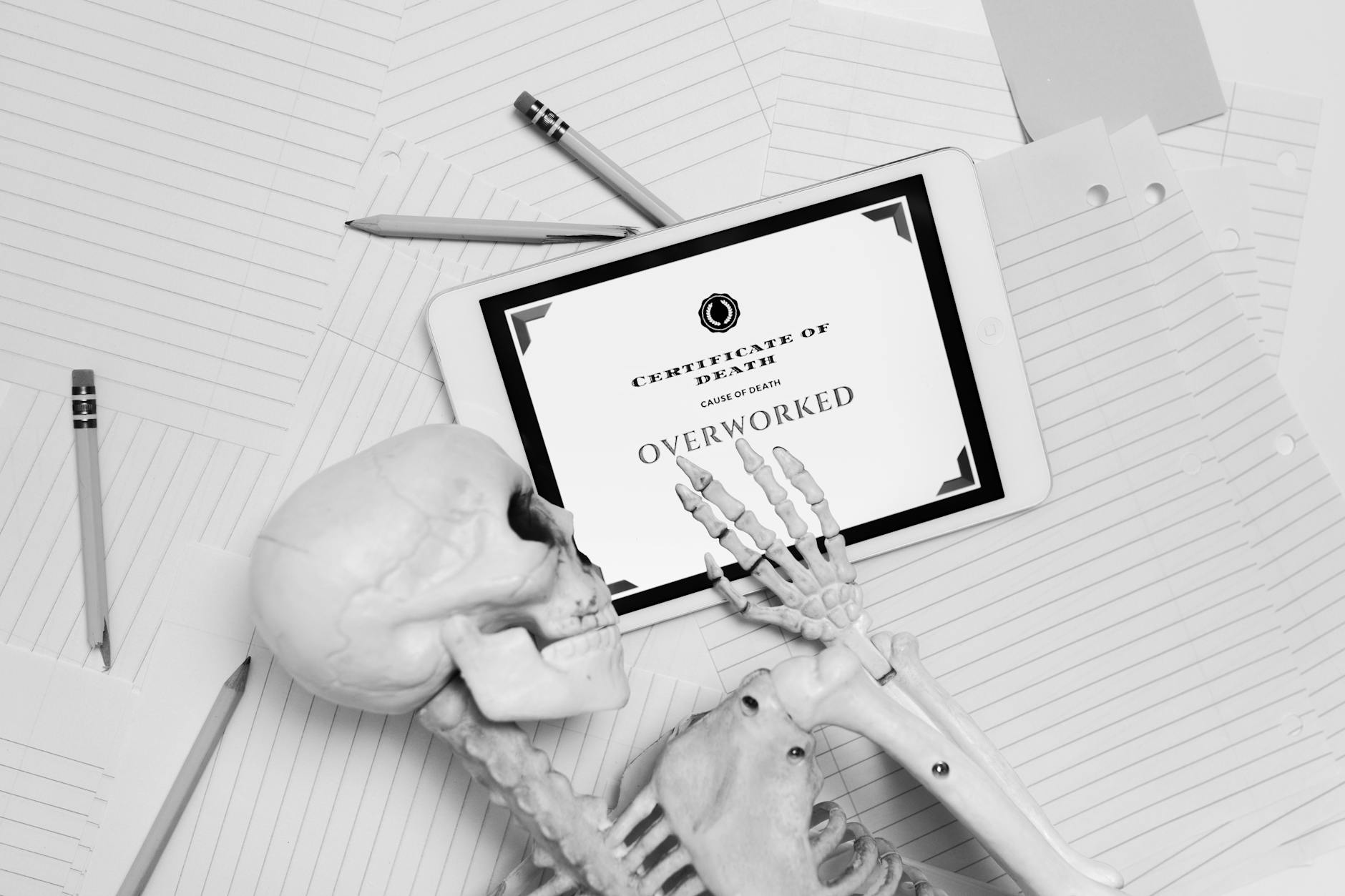Burnout isn’t just feeling tired after a long workweek—it’s a slow, creeping exhaustion that makes even small tasks feel overwhelming. If you’ve been fantasizing about quitting your job and moving to a remote island, you might be dealing with more than just stress. Recognizing career burnout early can help you decide if it’s time to change careers or simply adjust your work-life balance. Let’s break down the key signs that your job is draining you more than it should.
1. You Dread Mondays (and Every Other Workday)
Sure, nobody loves Mondays, but if the mere thought of logging in makes your stomach twist into knots, that’s a red flag. When every day starts with dread and ends with relief, your job might be taking more from you than it’s giving. You might even notice that Sunday nights feel heavy, filled with the weight of another exhausting week ahead.
If this feeling has been lingering for months, it’s worth asking yourself: is this just a rough patch, or is it time to seriously consider a career change? A fulfilling career shouldn’t feel like a never-ending countdown to Friday.
2. You Feel Exhausted, Even After a Full Night’s Sleep
Burnout doesn’t just drain your mind—it takes a toll on your body, too. You might be sleeping eight hours but still waking up feeling like you ran a marathon in your dreams. Chronic fatigue is one of the biggest warning signs that your work is mentally and emotionally depleting you.
Your body is constantly in survival mode, reacting to stress even when you’re resting. Over time, this can lead to headaches, muscle tension, and even a weakened immune system. If your energy is at an all-time low and coffee isn’t fixing it, your job might be the culprit. It might be time to explore a new career path that doesn’t leave you running on fumes.
3. Your Motivation Has Left the Building
Remember when you actually cared about your work? When you had new ideas, enjoyed tackling challenges, and felt a sense of accomplishment? If those days feel like ancient history, burnout might be stealing your motivation.
Tasks that used to be easy now feel impossible, and deadlines don’t spark urgency anymore—they just bring on more stress. Maybe you’ve started procrastinating more than usual or zoning out in meetings. When your work no longer excites or challenges you in a good way, it’s a sign that something needs to change. You deserve a job that makes you feel engaged, not one that turns you into a zombie staring blankly at your inbox.
Check out this article on new trend quiet quitting!
4. You’re Snapping at Everyone (Even Your Dog)
When work stress builds up, it doesn’t stay at the office—it follows you home, into your conversations, and sometimes even into your dreams. If you’re more irritable than usual, snapping at friends, family, or even your dog for no reason, burnout could be the cause.
A stressful job can make even minor inconveniences feel like the end of the world. If you notice yourself getting frustrated easily, take a step back. Are you actually mad about the dishes in the sink, or is work draining your patience? Finding a career that aligns with your energy levels and values could help bring back your inner calm.
5. You Daydream About Other Careers (Constantly)
It’s normal to imagine what life would be like in a different job, but if you’re spending half your day Googling “how to change careers in your 30s” or “best jobs that don’t suck,” it’s time to take that curiosity seriously.
Burnout can make you crave an escape, but what if your daydreams are actually pointing you toward a better path? Instead of pushing those thoughts aside, start exploring them. What kind of work excites you? What skills do you have that could transfer to a different industry? The fact that you’re even thinking about a change might be the biggest sign of all.
So, What’s Next?
If any (or all) of these signs sound painfully familiar, don’t ignore them. Burnout doesn’t just go away on its own—it demands action. Whether that means adjusting your workload, setting better boundaries, or taking steps to change careers, the important thing is to prioritize your well-being.
A career should challenge you, excite you, and reward you—not leave you exhausted and counting down the days until the weekend. If you’re feeling drained, take a deep breath and remind yourself: you have options, and you’re not stuck. The first step is recognizing burnout—the next step is deciding what you want to do about it.
Why Career Changes Boost Mental Health – The Psychology Behind Fresh Starts
Starting over can feel scary, but sometimes, it’s exactly what your mind needs. When your job feels like a never-ending loop of stress, frustration, and exhaustion, making a change can be the key to feeling like yourself again. Psychologists say fresh starts have a powerful effect on mental health, helping to reduce stress, increase motivation, and restore confidence. If you’ve been wondering whether it’s time to change careers, your brain might already be dropping hints that you need a new path.
Let’s dive into why a career switch can be the mental reset you didn’t know you needed.
1. A New Career Reignites Your Passion for Work
Remember when you used to feel excited about learning new things? When challenges made you feel energized instead of drained? Over time, staying in a job that no longer excites you can lead to something called “career stagnation”—where your brain is desperate for growth, but your job just isn’t giving it to you.
When you change careers, you introduce new learning experiences, skills, and environments that can reignite your passion. The brain thrives on novelty, which is why switching things up can make you feel more alive and engaged. Suddenly, you’re not just clocking in and out—you’re growing, evolving, and rediscovering what makes work enjoyable.
2. Stress Levels Drop When You Find the Right Fit
Let’s be honest: a bad job can feel like carrying a boulder around all day. If you wake up feeling anxious, dread your inbox, and spend Sundays filled with existential dread, your nervous system is probably overloaded. Prolonged work stress can lead to burnout, anxiety, and even physical health issues.
A career change gives you the chance to escape a toxic work environment, unrealistic expectations, or a job that simply doesn’t align with your values. When your work matches your interests, strengths, and personality, stress naturally decreases. Instead of feeling trapped, you start to feel empowered, which can work wonders for your mental well-being.
3. Your Confidence Gets a Much-Needed Boost
Nothing chips away at self-confidence quite like staying in a job where you feel unappreciated, underpaid, or stuck in place. Over time, you start to doubt your skills, question your worth, and wonder if you’ll ever find something better. But guess what? You absolutely can.
Making the decision to change careers is an act of self-trust. It forces you to recognize your strengths, take control of your future, and believe that you deserve more. Once you step into a role that aligns with your skills and passions, your confidence skyrockets. You’re no longer just “getting by”—you’re thriving, and that feeling is priceless.
4. A Fresh Start Breaks the Cycle of Negativity
Ever notice how being unhappy at work spills into other areas of life? You start venting more, losing patience with loved ones, and even dreading social events because you’re mentally exhausted. A job that drains you doesn’t just stay at the office—it follows you home, impacting your relationships, mood, and overall outlook.
When you make a career switch, you reset your mindset. Instead of feeling stuck, you gain a sense of possibility and excitement for the future. You start seeing opportunities instead of roadblocks. And let’s be real—your friends and family will probably appreciate the change, too.
So, Is It Time for You to Make a Change?
If your job is making you miserable, it’s not just “work stress”—it’s a sign that your brain and body need something different. A career change isn’t just about money or titles; it’s about creating a work life that supports your mental well-being.
You don’t have to stay stuck in a job that drains you. You have the power to pivot, explore new opportunities, and build a career that actually makes you feel good. Sometimes, the best thing you can do for your mental health is take that leap—and trust that you’re making the right move.
Enhance your career journey with my AI-powered career coaching services, offering personalized workbook guidance, resume optimization, and interview preparation & a GPT. Explore Here!
Exploring Jobs That Prioritize Work-Life Balance – Roles with Less Stress
Work shouldn’t feel like an endless cycle of stress, exhaustion, and late-night emails. If your job is running you into the ground, it might be time to consider a career change to something that actually allows you to breathe. Finding a role that prioritizes work-life balance isn’t just about working fewer hours—it’s about creating a career that supports your well-being, gives you flexibility, and doesn’t leave you drained at the end of the day.
Let’s explore some stress-free career paths that might just be the reset you need.
1. Remote and Flexible Roles – Work From Anywhere, on Your Terms
The days of sitting in traffic for hours just to spend eight more stuck at a desk? Overrated. Many companies now offer remote and hybrid roles that let you work from the comfort of your home, a cozy café, or even a beachside Airbnb.
Careers in digital marketing, content writing, UX design, and software development often come with flexible schedules, giving you more control over your day. Want to hit the gym at noon? Take a mental health walk at 3 PM? With the right remote job, you can. And let’s be honest—working in pajamas? A major bonus.
2. Creative Careers – Less Stress, More Self-Expression
If your current job feels robotic, it might be time to switch to something that allows you to actually enjoy your work. Creative careers, such as graphic design, illustration, copywriting, or even photography, let you use your imagination while keeping stress levels low.
Unlike high-pressure corporate jobs, creative fields often come with flexible deadlines and project-based work, meaning you won’t be constantly racing against the clock. Plus, nothing beats the satisfaction of seeing your ideas come to life—whether it’s a beautifully designed website or a catchy social media campaign.
3. Nature-Focused Jobs – Trade the Office for the Outdoors
If the thought of another meeting in a windowless room makes you want to scream, consider a career change that gets you outside. Nature-based jobs, like park ranger, landscape designer, or wildlife photographer, offer a chance to ditch the cubicle and work in peaceful, natural environments.
Spending time outdoors is proven to lower stress levels and improve mental health, so why not make it part of your career? Whether you’re tending to plants, caring for animals, or simply working with natural elements, these jobs offer fresh air, movement, and a break from screens.
4. Jobs in Wellness and Mental Health – Helping Others, Helping Yourself
Sometimes, the best way to create a less stressful career is by helping others reduce their own stress. Jobs in wellness, like yoga instructor, career coach, therapist, or personal trainer, allow you to support people while also maintaining balance in your own life.
These careers often offer flexible schedules, meaningful work, and the satisfaction of making a real difference. Plus, when you spend your days encouraging mindfulness, fitness, or personal growth, it’s hard not to absorb some of that positive energy yourself.
Finding the Right Work-Life Balance for You
Not every job has to come with late-night deadlines, constant pressure, and zero personal time. If your current career is burning you out, it’s okay to take a step back and ask yourself: What kind of life do I actually want? A career change to a less stressful role might be exactly what you need to feel happier, healthier, and more in control of your time.
You deserve a job that fits your life—not one that takes over it.
Making a Gradual Shift to Avoid Burnout – A Step-by-Step Transition Plan
Burnout doesn’t just sneak up on you—it builds over time, leaving you drained, unmotivated, and questioning why you even set that early alarm. If you’ve been feeling exhausted by your job but don’t want to take a reckless leap into the unknown, a gradual career change might be the perfect solution. Transitioning slowly lets you explore new opportunities while still keeping financial stability and peace of mind.
Here’s how you can make a smooth shift into a career that actually excites you—without crashing and burning in the process.
1. Reflect and Research – Know Where You Want to Go
Before you start sending out résumés or signing up for new courses, take a step back and think about what you really want. What parts of your current job make you want to career change? What skills do you love using?
Research careers that align with your interests, values, and desired lifestyle. Read job descriptions, watch YouTube videos about day-in-the-life experiences, or even reach out to people in industries that intrigue you. A career change is a big deal, so the more you know, the easier it will be to move forward with confidence.
2. Upskill and Experiment – Test the Waters Before You Dive In
Jumping straight into a new field without preparation can be overwhelming, so ease into it by developing new skills at your own pace. Online courses, weekend workshops, and freelance gigs can help you gain experience without quitting your current job.
If you’re eyeing a creative career, start a small side project. If tech interests you, try coding bootcamps or design certifications. The goal isn’t to become an expert overnight—it’s to build confidence and see if the new path actually feels right before making a full commitment.
3. Adjust Your Workload – Reduce Stress While Transitioning
Burnout doesn’t disappear just because you’ve decided to change careers. If your current job is already draining you, find ways to lighten your workload while you prepare for your next move. Can you delegate tasks? Cut back on overtime? Say “no” more often?
If possible, consider reducing your hours or switching to a less demanding role within your company. Having extra time and energy will make the transition feel much more manageable and prevent you from reaching total exhaustion before you even start your new journey.
4. Make the Switch – Plan Your Exit Strategically
Once you feel confident in your new skills and career direction, it’s time to map out your official transition. Decide when and how you’ll leave your current job—whether it’s securing a new role before quitting or slowly building up a side business until it’s sustainable.
If possible, save up a financial cushion to cover unexpected bumps along the way. A planned exit will give you more control over the process and help you avoid panicked decisions that could lead to more stress down the line.
Take Your Time and Avoid the Burnout Spiral
A career change doesn’t have to be a high-stakes gamble. By easing into the transition, building skills gradually, and planning ahead, you can move toward a career you love—without completely burning yourself out in the process.
The key is balance. You’re not running away from a bad job; you’re stepping into something better, on your terms. And trust me, your future self will thank you.




